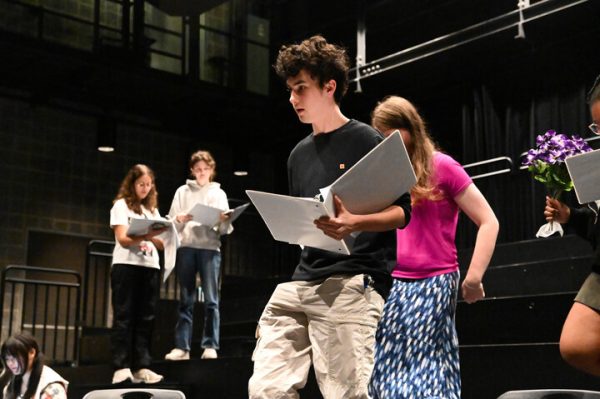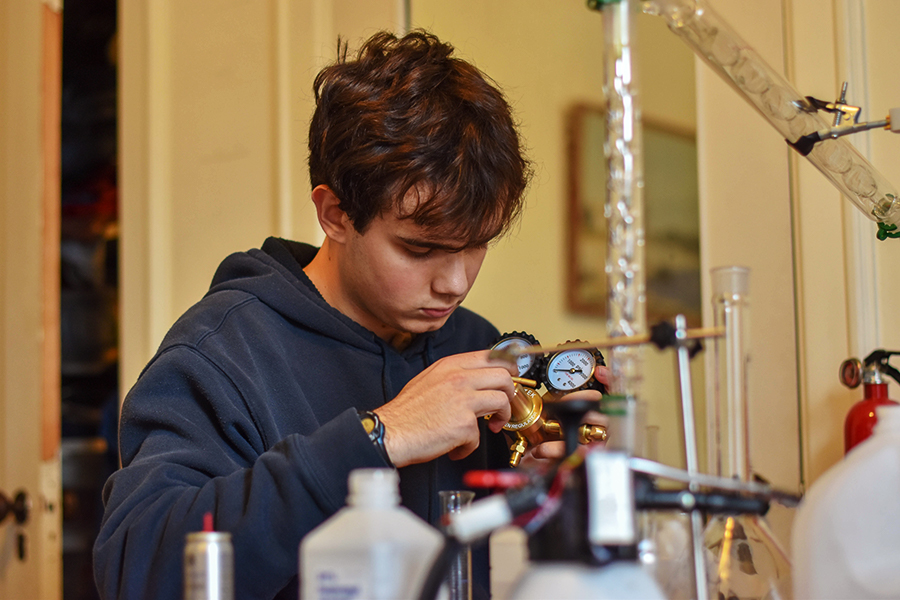Senior enjoys creating complex engineering projects
Ensconced in his home, Paul Staley adjusts part of a rocket he is building. Paul has worked on several other projects, including multiple computers and a 3D printer.
A humidifier, model rockets, and the Physics Machine Shop at University of Chicago — while they may not seem similar, these are all things one U-High senior has spent hours figuring out or, in his own words, “messing with.”
Whether the project is as complex as a rocket engine or as simple as a power button, Paul Staley enjoys finding solutions to problems in ways that teach him more than just “simple fixes” but also lead to interesting, complex projects. His latest build, a rocket engine, is his most ambitious yet.
Paul spends his time building machines and trying to figure out how things work. For him, the fun comes in discovering new solutions, and his rocket engine is the perfect way to combine his love for building with his creative thought process. When discussing how he came across this idea, he said, “I had a bunch of model rockets, you know, from when I was younger. So I was looking at those and I thought, ‘Those are super cool. Why don’t I, you know, see how difficult it is to actually make this something real?’”
While Paul has built multiple computers and a 3D printer, the construction of his rocket engine has proved to be the most challenging, time-consuming build. Paul said he has had to do extensive research due to the unique construction.
He said, “I’m used to, you know, you go online, you look it up, and there’s someone who’s probably done it and you can find it on YouTube.”
Paul works on as much of the rocket as he can at his house, while the more complicated, hazardous pieces remain at the Physics Lab at the University of Chicago. After discussing it with his father, who works at the university, Paul visited the Physics Lab. Now, components of his rocket engine are being constructed by machines designed for projects like this.
In other projects, Paul has been able to find instructions online, the engine has taught Paul different methods of constructing.
“The only places where people are actually describing how to build a rocket engine are like declassified things from like 60 years ago and like random people who clearly don’t know exactly what they’re doing,” Paul said. “So that’s been really interesting — actually having to, like, purchase books and spend, like, hours going through them.”
Paul not only felt inspired by his interest in finding out how things work, but also his plans for a possible future career as a test pilot.
“I think it definitely applies — especially if you’re in a position where you’re, you know, flying and, you know, making decisions about the airplane,” he said. “You need to have a really strong engineering background and this kind of thing, actually, like, kind of thinking outside of the box, designing new things… I can imagine it would be helpful for that.”
Mr. Saez, Paul’s physics teacher from last year, said he thinks Paul’s interest in experimentation and critical thinking makes for a great engineer.
“He could make sense of almost anything,” Mr. Saez said, “and, you know, he would always play with things that I had around just to make something happen. So he’s a little bit unconventional in the way he thinks.”
Mr. Saez also expressed hope in Paul’s rocket engine, saying he is sure it will be wonderful in the end.
Paul has advice for anyone looking to do something similar.
“You need to go into it understanding you literally know nothing about it and have no idea what the problems are going to be…,” he said. “The mindset is even different from just, like, building something where you’ve got instructions — like, you need to live with the fact that you’re going to make massive mistakes.”
Ultimately, Paul hopes to finish this rocket by the end of the school year.
Paul said even small things can consume his time, like a power button on his humidifier that he noticed did not work correctly.
“I could have put a piece of tape over it, it would have done — it’d probably work even better,” he said, “but, the point is I just start messing with things if I have them, and eventually, sometimes like this, it turns into something bigger.”








